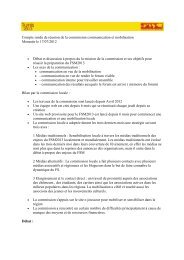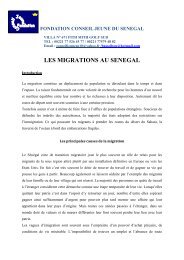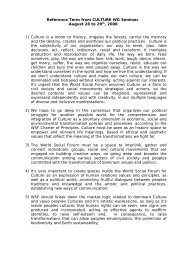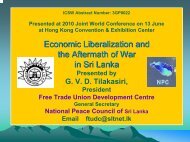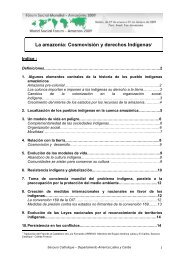Create successful ePaper yourself
Turn your PDF publications into a flip-book with our unique Google optimized e-Paper software.
<strong>Press</strong> <strong>Report</strong> <strong>Europe</strong> <strong>WSF</strong> <strong>2009</strong><br />
In "Non-Governmental Diplomacy", which has now been translated into Spanish, the activist runs over the big<br />
international debates held in recent years on issues like human rights, the environment, and the fight against<br />
discrimination, and how, in his view, civil society organisations have positively influenced them.<br />
He also analyses the hurdles and costs that NGOs have had to face in the process, like intimidation, discrediting and the<br />
treatment of activists and groups as criminals.<br />
Since the book first came out in March 2006, many things have happened, including a major global economic meltdown.<br />
But the author says his thinking has not changed.<br />
"I continue to follow the same reasoning, because NGOs have always called for a 'refounding' of the institutions,<br />
transparency in the economy, regulations of the market based on solidarity and cooperation, and above all, a more<br />
equitable way of sharing and distributing the planet's benefits and wealth," Rouillé d'Orfeuil said in this interview with IPS.<br />
Although the activist clarified that he is not familiar with the situation in all countries, he said he believes the tough<br />
economic situation will not have a negative impact on financing for NGOs.<br />
"In France, in particular, people are still donating, there has been no decline, especially at Christmas time, and the<br />
government's funding has also been maintained. Let's wait and see what happens," he said.<br />
IPS: From your perspective, what role should NGOs play at this time of global economic crisis?<br />
HENRI ROUILLÉ D' ORFEUIL: NGOs should generate mutual agreements and build positions with their own<br />
governments at the national level and with other bodies at the international level, which could help them carry out, plan<br />
and bring about concrete actions more easily. That is what will give them strength.<br />
The methods are always the same: public opinion campaigns, requests to the national government, etc.<br />
IPS: Have NGOs been active in this sense?<br />
HRO: I think so. I recently attended a conference on development, where a government decided to support, in the<br />
framework of the United Nations, the movement proposed by the NGOs.<br />
This could be interpreted as a highly positive factor, because NGOs carry out very precise actions and are exercising<br />
pressure.<br />
But something that is much more important for the compelling action of NGOs is the fact that (as a result of the economic<br />
crisis) capitalism has generated great doubts in society about the current system, which has helped create a context in<br />
which new ways of thinking are more easily accepted by people.<br />
In your view, how important today is the World Social Forum (<strong>WSF</strong>), whose next edition will be held Jan. 26-Feb. 1 in the<br />
northern Brazilian city of Belem? Does it play any role today in the world of diplomacy?<br />
HRO: I see it as a physical meeting place where we can discuss our programmes and alliances, and where the different<br />
movements and NGOs network and coordinate and build synergies. I could mention Feb. 15, 2003, when 20 million<br />
people (around the world) mobilised against the war in Iraq, in protests organised on the basis of the <strong>WSF</strong>.<br />
IPS: But over the years, has the <strong>WSF</strong> grown stronger or weaker? What prospects do you foresee for it?<br />
HRO: I don't know what the future will hold. I have taken part in every edition of the <strong>WSF</strong>. For us it was a big novelty to<br />
meet (for the first time) in 2001. We have tried new formulas, we have tried holding meetings in different regions. But I<br />
think we need to let the Forum evolve. We can't repeat the same things every year.<br />
However, the present crisis allows us to generate, in this year's edition, new structures for the different movements to<br />
respond to the problems, with responses that û I stress - should not be radical but should effectively respond to the<br />
current situation.<br />
IPS: In this context, are there issues that should be priorities for NGOs?<br />
HRO: NGOs are diverse, each group has its own specific needs, its issues - like anti-personnel land-mines, for instance;<br />
there are no common agreements. But there are issues that NGOs could work together on, like (fighting) free trade<br />
agreements or the regulation of the market, which are major challenges that we are facing today.<br />
At this time, I would highlight two issues: regulation of the market and protection of the environment, which are two<br />
fundamental questions in the activities of NGOs.<br />
2




